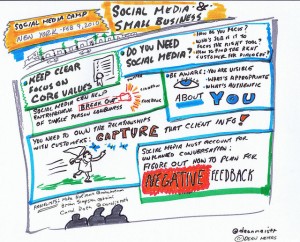
A corporate social media policy serves as the starting point for an organization's social media risk management. It goes beyond being a list of do’s and don’ts. The document is meant to serve as a source for educating employees on protecting the organization from the unintended misuse of social networks to the detriment of the organization. This policy often extends to cover blogs, wikis, message boards, chat rooms, online forums, and other sites/services that allow users to share information with others.

How to Lay the Groundwork
There are many ideas that are to be taken into consideration when developing a social media policy. First and foremost, it’s important to define what social media is to the company, and the purpose of the policy. This section should include the company’s strategy, goals, and how employees can achieve those goals.
Be Upfront
Make sure the policy is crystal clear on what kind of behavior is absolutely not allowed, and prohibited forms of communication. If their social media activity is going to be monitored, let it be known. Include any legal advice you have have received, along with correct clauses that tie into monitoring. Confidentiality, privacy, honesty/accuracy, respect, competition, and fair use are also points that must be included, as well as consequences if these were to be violated.
Provide Examples
Include images that demonstrate social media being used correctly and incorrectly by companies. This could include customer service engagement, commentary, and the sharing of images that are defamatory, libelous, or could create a hostile work environment. Some industries may be trickier to represent on social media than others, so assure them that when in doubt, to turn to a supervisor.

Be Conscientious
It would be wise to include a section that states that employees should get appropriate permission before posting images of current or former employees, and business associates. They should also seek permission before using third-party copyrights, trademarks, service marks, and other forms of copyrighted material and intellectual property.
The Final Touch
Last but not least, for documentation purposes, there needs to be a section where the employee signs the policy, which indicates that they have fully read and understood it. Upon them signing it, make it clear that their personal social media accounts must be kept separate from the corporate social media accounts, and if they are to post material that involves anything tied to the company, it’s recommended they include a disclaimer that their postings are their own, and don’t represent the company’s positions, strategies, or opinions.
Bear in mind - it doesn’t matter how beautifully crafted the social media policy is, if employees aren’t trained on its content.
by Jonathan Franchell, CEO of Ironpaper - For more tips and hacks: Need to remove a new line after h1 tags? Both web designers and SEO practitioners need to employ headline tags: H1, H2, H3 in several ways to improve web page structure and tag...

The Crowded Arena of the IT Marketplace Updated December 2024 The Information Technology (IT) landscape is experiencing rapid growth and intensifying competition. IT spending is projected to reach nearly 5.1 trillion U.S. dollars in 2024, a...

Updated December, 2024 The field of digital marketing is evolving rapidly in response to new technology and changing buyer expectations. To help career-minded marketers, we’ve rounded up the top 10 skills needed to succeed in the field. These are...

The marketing industry is transforming significantly due to generative AI and increasing market complexity. Gartner's prediction of a 25% decline in traditional search traffic suggests that the era of search engines is dying. AI tools, particularly...
